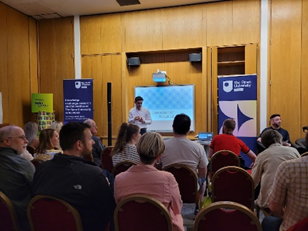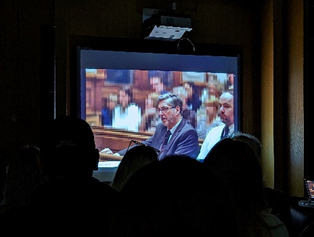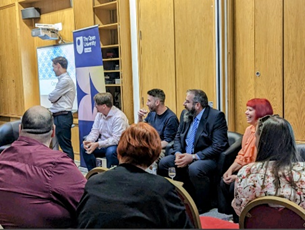Reflections from 'Conviction or Acquittal: You Decide' event

This is the second part of the blog/news series of the reflections from the ‘Conviction or Acquittal: You Decide’ session, co-authored by Hayley Ness, Francine Ryan and Louise Taylor.
The interactive Jury Hub event was co-organised by Dr Lee Curley and Derek Goldman with support from Kieran McKinstry, at the internationally renowned Glasgow based Aye Write Book Festival which was a huge success. This 2-hour interactive session was made even better by a very lively and engaged audience.
Format of the event
Stuart Johnstone started the event by reading an interesting, funny and very relevant section of his latest novel. Lee Curley, who chaired the event, then introduced the audience to the video of a reconstructed trial. After the audience had viewed this, they were asked to form small groups (juries), to deliberate and to come to a verdict. Once they had reached their verdict, a panel of experts including Stuart, Hayley Ness, Tony Lenehan KC (head of the Criminal Bar in Scotland) and James Munro, discussed aspects of the trial with the audience and answered questions.

The whole group were mixed in terms of the verdict. Many in the group felt that the absence of any forensic evidence, meant that the only verdict they could reach was ‘not proven’. They simply felt that not enough evidence had been presented in order to determine guilt. A few people in our group did however come to a guilty verdict (including one of the expert panellists), using only the evidence that was presented. This led to some engaging discussion on expectations.
Interestingly, while the Judge’s instructions clearly stated that the jurors should only consider the evidence when making their decisions, it was evident from the discussion that many of our jurors had been influenced by how the evidence had been presented. The mock trial had been cleverly filmed so that one witness was very nervous, another very confident, and another who had been questioned on the reliability of his evidence. This led to a fascinating discussion on the often-unconscious impact of language and presentation on our decision-making.
Audience feedback
The feedback from the event was fantastic. Everyone enjoyed it. When asked ‘What did you learn?’, the responses included that ‘People do support the not proven verdict’; ‘How a court case proceeds’; ‘A lot about bias and how this would impact my contribution to a jury’; ‘I learned how a trial runs and what it’s like to be a part of a jury which was great’.
When asked ‘What did you enjoy most?’, the feedback included ‘watching the court case’; ‘very interesting debate. Enjoyed the short story’ ‘listening to the views of the panel with different expertise’; ‘the discussion and being a jury’; ‘I loved the mock trial and group discussion. I thought the speakers were really knowledgeable and I trusted their insights. It could have been fun to provide everyone with paper to take notes during trial’; ‘really enjoyed the citizen’s/people’s approach to a question! More please!’.
Key findings
What is particularly interesting about this event is that it demonstrates that the mock jurors who participated valued the availability of the not proven verdict, despite the Scottish Government’s plans to remove it under the Victims, Witnesses and Justice Reform (Scotland) Bill. Although there is no legal definition of the not proven verdict, it is thought that jurors use the verdict to acquit when they believe that the accused is guilty, but that there is insufficient evidence to establish guilt beyond a reasonable doubt. While some have argued that the verdict provides an important safeguard against the risk of wrongful conviction, others have contended that the verdict is problematic because of its lack of definition and because it allows jurors to sit on the fence in finely balanced trials. For anyone interested in finding out more about how jurors use the not proven verdict, an article written by Dr Lee Curley available on OpenLearn is well worth a read.
The not proven verdict is just one of the unique and longstanding features of the Scottish system which has set it apart from the approach taken in England and Wales (and many other jurisdictions) where there are only two verdicts available: guilty or not guilty. Aspects of the English and Welsh criminal justice system and some comparisons with the Scottish system are explored in the OU undergraduate Level 1 Law module W111: Criminal Law and the Courts.
Impact of the event

This interactive event and others like it are an effective way of helping members of the public learn more about the law giving people the opportunity to come together to gain a better understanding of how the criminal justice system works and how it can impact on people’s lives. The participation from the audience which created a platform for dialogue, discussion and collaboration led to an exchange of ideas, questions, and an opportunity to share experiences that can better inform all of those who attended. In the OU Law School, we are also passionate advocates of community engagement, the Open Justice Centre supports law students to work in their communities to focus not just on providing legal services, but also on empowering individuals with legal knowledge. The Centre works with a range of community partners delivering innovative projects that seek to support people and their communities to make informed decisions, understand their legal rights and responsibilities and navigate the legal system with confidence. To find out more about the work of the Open Justice Centre please visit our website by selecting this link to Open Justice Centre.
Next steps
The outreach work carried out by our academics connected with experts within this specialist field of knowledge means that the OU is making the learning content accessible to the public who may not have had any previous connection within this subject area.
You can read more about the links found in the above article in the list below:
- The Scottish Parliament – Bills and Laws – Victims, Witnesses and Justice Reform (Scotland) Bill
- The Justice Gap – Scrapping Scottish ‘not proven’ verdict risks miscarriages of justice
- Scottish Government – The not proven verdict and related reforms: consultation analysis
- OpenLearn - Scotland’s ‘not proven’ verdict helps juries communicate their belief of guilt when lack of evidence fails to convict
- OU undergraduate Level 1 module - W111: Criminal law and the courts
- OU – Open Justice Centre webpage
In the future we hope to do more public engagement and showcase the research that we do within a wide range of contexts from arts or culturally based festivals to being knowledge-based sponsors for the Aye Write Book festival and exploring teaching resources within the virtual reality space.
